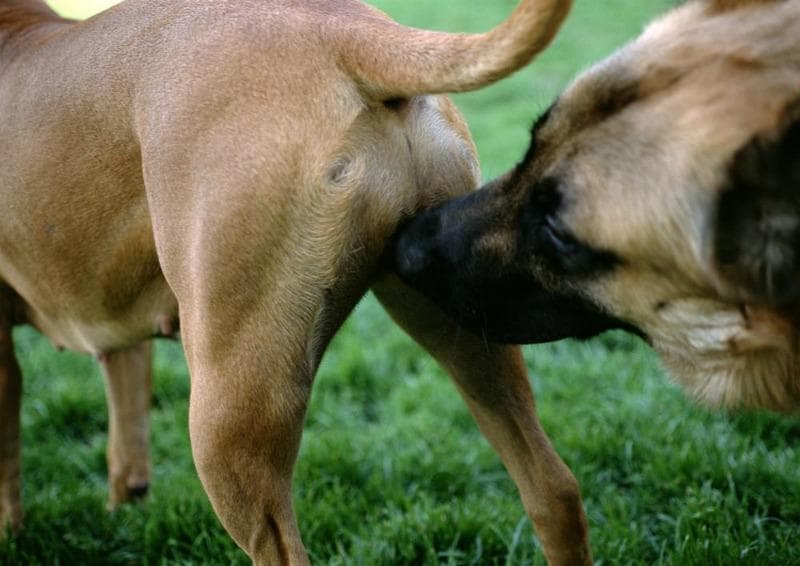If a metallic smell is coming out of your dog’s vagina, you can’t help getting concerned.
Since a metallic smell is often associated with blood, your first response may be checking if your dog is injured.
But you can’t see any injuries, and so you rule out blood.
Your next step of action may be giving your fur baby a full bath, and if the smell doesn’t go away, you’re left even more confused.
So, why does your dog’s vagina smell like metal?
Well, here are possible reasons:
1. The Anal Glands are to Blame
In most cases, the metallic smell emanates from the anal glands and not the vagina itself.
This happens when your dog is leaking the anal sac fluid or there is anal gland blockage.
And sometimes, you may smell the odor coming out of her mouth because she is licking the secretion from her anus.
Essentially, anal glands or anal sacs are two small pouches situated on either side of your pup’s anus.
They often produce smelly secretions, which dogs use to identify each other or mark their territories.
A dog’s body is supposed to naturally release the anal fluid during defecation.
But, sometimes, the anal glands may not function as they should due to a blockage, and if the dog is not treated in time, this can result in infections.
Some of the common signs that your dog’s anal glands are blocked include:
- Abnormal tail position
- Swelling or redness on the rear end
- Licking of the rectum
- Dragging or scooting the rear end
- Sudden jumping or crying out
- Painful bowel movements
- Evidence of fluid on an area the dog was sitting (anal glands are leaking)
Some of the most common causes of dog anal glands blockage include:
A. Digestive Problems
During defecation, muscle contractions cause the emptying of the anal glands.
However, there is a small fluid that is left on the anus, to serve as a marking scent, and this helps dogs to identify one another.
If your fur baby has digestive problems, such as diarrhea, smaller stools, or soft stools, the anal glands will not be able to empty normally or they may fill up excessively.
B. Obesity
If a dog is excessively obese, her anal glands may be placed too far internally, such that they can’t empty properly.
Also, her muscles may not have the required tone to help contract the anal glands during defecation.
C. Allergies
Just like humans, pets also suffer from allergies, and this can contribute to anal gland problems.
The common allergy categories in dogs include food allergies, flea-bite allergies, indoor allergies, and outdoor allergies.
If the allergy happens in the perianal region, their anal glands could be blocked.
Normally, anal gland blockage is treated through the expressing procedure.
While this is a procedure that can be done at home, it is risky, and therefore, it is better off done by a professional.
The vet gently squeezes the glands to release the fluid from the duct.
They should continue this process until all the pressure has been removed from the gland and the fluid is fully emptied.
After the procedure, your dog may still scoot her rear end on the floor, but don’t worry; this won’t last long.
Related Posts:
12 Best Probiotic for Dogs with Allergies
Best Foods for Dogs with Allergies: Everything You Need To Know
2. Probably Your Dog Is On Heat

If your dog’s vag smells like a coppery metal, it could be tied to blood.
Generally, blood contains iron, which could be responsible for the metallic smell.
A dog on heat will usually secrete a blood-tinged vaginal discharge.
In fact, one of the best indicators that a female dog’s season has begun is the presence of a bloody vaginal discharge.
(The easiest way to confirm the presence of these discharges, particularly during the early days of a female dog’s cycle, is to check at your dog’s bedding or on the floor where she likes playing, walking, or sleeping).
So, if your dog is on heat, it could be the cause of the metallic smell.
However, if your pup has been spayed or if you are sure that your dog isn’t on heat, then a bloody discharge could be a sign of other health issues.
Bloody discharge from a dog’s vag could result from trauma, infections, tumors, anatomic abnormalities, blood clotting disorders, and other conditions that affect the urinary tract.
One of the best methods of reducing any kind of odor that is related to a dog’s heat cycle is dosing the dog with liquid chlorophyll.
To have the most efficacy, canine experts recommend using the liquid at the very beginning of your pup’s season.
Many dog owners have also reported significant success with doggy diapers.
A diaper can either contain odor by itself or a small dab of VapoRub Ointment can be applied on its outer surface to further eliminate the scent.
For the best brands of doggy diapers, check out this post: 10 Best Dog Diapers for Periods
3. Your Dog Could Be Suffering From UTI
Metallic smell from your dog’s vag could also be a sign of urinary tract infection (UTI).
UTI happens when bacteria enter the urethra, causing infections that can affect the dog’s urinary tract, bladder, and kidneys.
It is caused by a wide range of factors including weakened immune system, tumors in the urinary tract or bladder, urinary tract abnormalities, and illnesses such as diabetes.
The scent of UTI can be different in each dog. Some people describe it as rancid, others say it is musky, others label it as a rotten fish smell, and still, others say it is a metallic smell.
If it smells to you like metal, you could be smelling iron, which is an essential element in the heme group in the blood (a component of the hemoglobin protein).
The bacteria which could be causing the UTI in your dog could be breaking the heme group, increasing the accumulation of iron in your pup’s urine.
Besides pronounced odor (different from the normal urine scent), other symptoms of UTI in dogs include frequent urination and thirst, cloudy or bloody urine, whimpering during urination, peeing in the house, and genital licking.
Without care, UTI infections can spread to your pup’s kidney and cause other complex health issues.
So, take your pup to your local vet immediately if you suspect she has UTI. Your vet will do a urine test to establish whether it is UTI or not.
A vet will also prescribe an appropriate antibiotic to clear up the infection.
You may also want to check: Can I Use Vagisil on My Dog?
4. It Could Be Pyometra
Pyometra is a potentially fatal uterine infection that can also lead to a strong metallic odor.
The word Pyometra is Latin, and it means ‘pus uterus.’
So basically, your dog is releasing unwanted pus from the uterus, which is the cause of the smelly odor.
In most cases, this condition occurs in old female dogs, especially one or two months after a heat cycle.
Some of the common signs of pyometra include unpleasant smell from the vagina, increased urination and thirst, excessive pus emanating from the vagina, loss of appetite, and lack of energy among others.
As aforementioned, Pyometra is a potentially fatal infection, so your dog will need surgery treatment immediately.
The surgical treatment involves removing the uterus and the ovaries, in a process that is called an ovariohysterectomy. This is a more complicated procedure than ordinary spaying.
If a dog is diagnosed with Pyometra at advanced stages, the surgical procedure is even more complex and the hospitalization period is longer.
She will also require intravenous fluids before and after the surgery to stabilize her condition.
To prevent Pyometra, you should consider spaying your fur baby when she is still young.
But, if you want her to breed, you can spay her after she has passed her active reproductive years.
5. Your Pup Could Be Dealing With Metritis

If your pup has recently given birth, she is vulnerable to developing metritis.
According to Petmd, metritis is an inflammation of a dog’s uterus lining due to bacterial infection (E. Coli) and often occurs a week after a dog has given birth.
The condition can also develop after a medical or natural abortion, non-sterile artificial insemination, or miscarriage.
It is particularly common in dogs that went through difficult delivery or those who may have retained a placenta (or even a puppy).
Some of the most common symptoms of metritis in dogs include nasty-smelling vulvar discharge (which could be the cause of the metal-ly vag smell in your dog), fever, dehydration, abdominal swelling, loss of appetite, less milk production, and puppy neglect.
Like other conditions we’ve highlighted above, take your pup to the vet immediately if you suspect that she could be suffering from metritis.
The vet will test the discharge for bacteria, and if necessary, perform X-ray or ultrasound to view your pup’s uterine interior.
Based on the results, the vet will prescribe appropriate antibiotic drugs or therapy for your furbaby.
The Takeaway
Now that we’ve helped you identify why your dog’s vag smells like metal, you probably wondering: what’s next?
Well, the next time you smell a metallic odor coming out from your dog’s vagina, don’t take it lightly.
Early detection is key to curing some of these conditions.
If you confirm there are no injuries and the smell does not go away even after a full bath, call your vet immediately for more professional input.
Related Posts:
Why Does My Dog Still Smell After Her Glands Have Been Expressed?
12 Best Dog Diapers for Male Dogs
As an Amazon Associate, we may receive a small commission from qualifying purchases but at no extra cost to you. Learn more. Amazon and the Amazon logo are trademarks of Amazon.com, Inc, or its affiliates.

